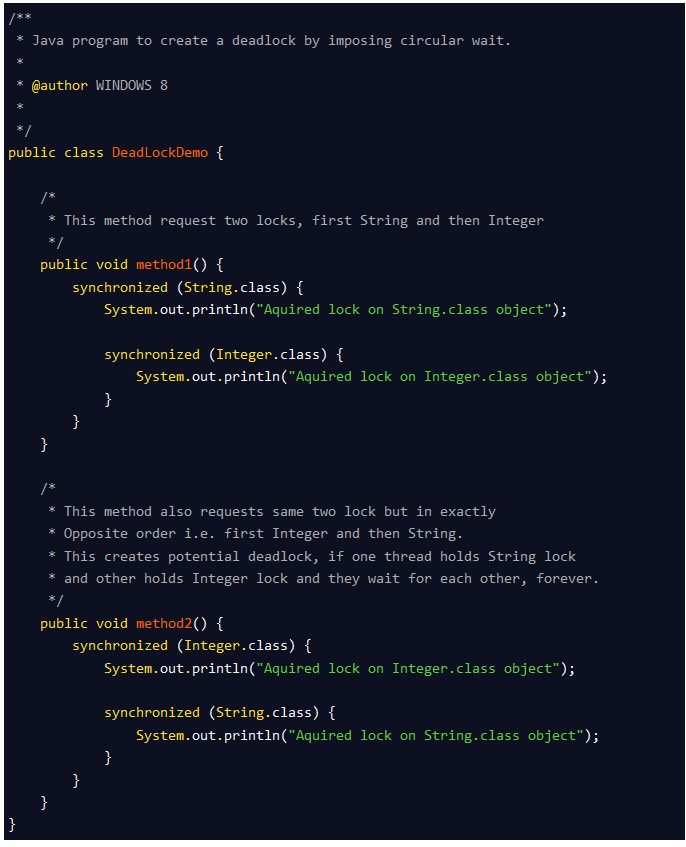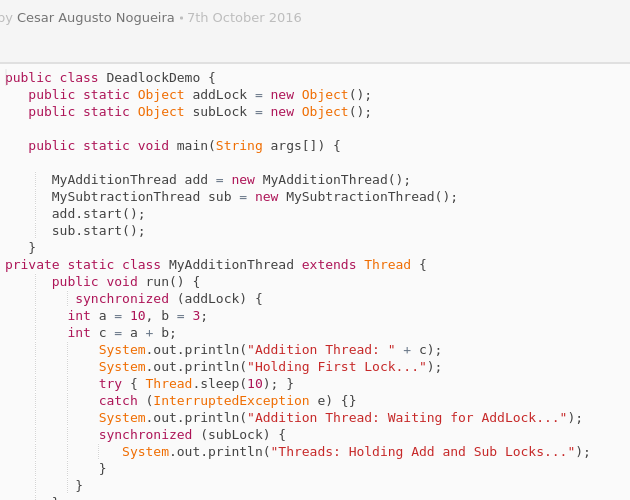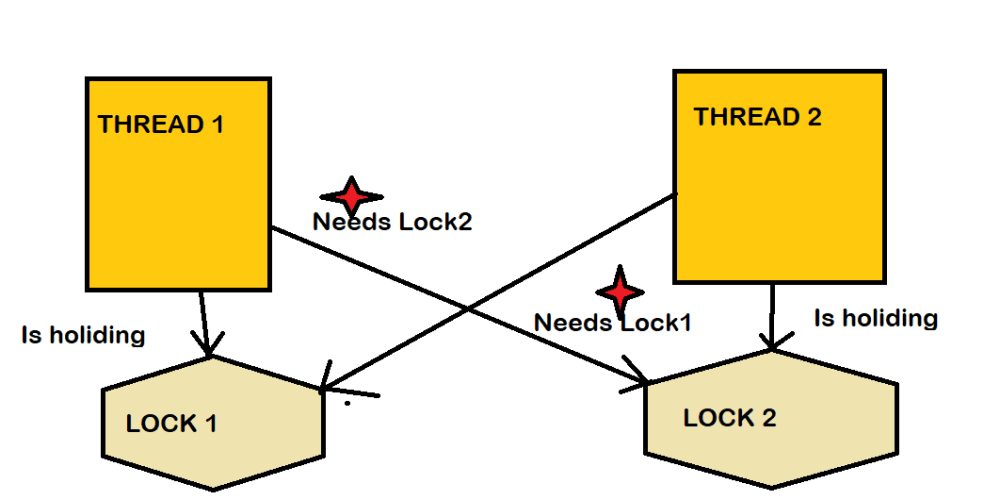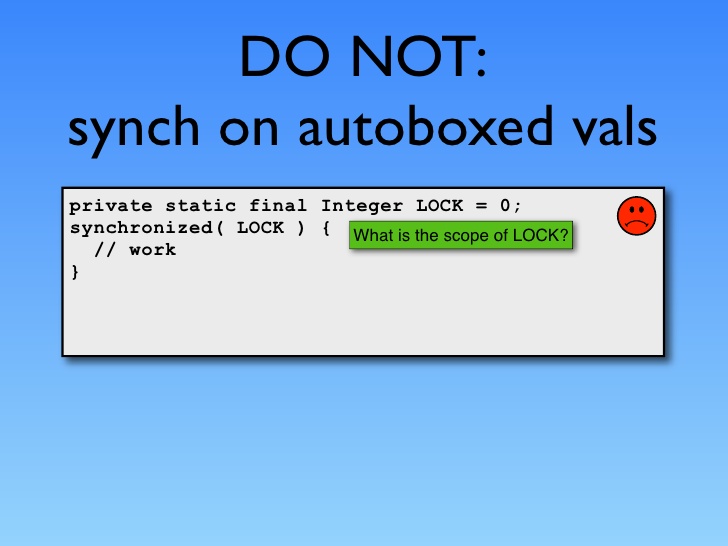
How To Handle Deadlock In Java? Examples Entri Blog
There are several methods to prevent deadlock in java to a certain extent though not always. Avoid nested locks: One main reason for a deadlock is providing multiple locks to multiple threads. Avoid unnecessary locks: Always try to avoid providing unnecessary locks to threads. We need to lock only the required resources for a particular thread.

How to avoid deadlock in Java Threads
Deadlock in Java is a part of multithreading. Deadlock can occur in a situation when a thread is waiting for an object lock, that is acquired by another thread and second thread is waiting for an object lock that is acquired by first thread. Since, both threads are waiting for each other to release the lock, the condition is called deadlock.

What is Deadlock in Java How to Avoid Deadlock in Java? DataTrained Data Trained Blogs
The answer is simple — when two or more threads are waiting for each other to release the resource they need (lock) and get stuck for infinite time, the situation is called deadlock. It will only.

How to avoid a Deadlock while writing Concurrent Programs — Java Example Learning Actors
To avoid deadlocks in Java, you can follow these best practices: Avoid locking on multiple objects: Instead, lock only on the lowest-level objects and make sure to lock them in the same order in.

Avoiding deadlocks in Java Codepad
To avoid deadlocks like this, you can follow best practices for concurrent programming, such as acquiring locks in a fixed order, using timeouts when acquiring locks, minimizing the scope of locks, and using higher-level concurrency constructs like java.util.concurrent package. How to Detect Deadlock in Java

3 What is Deadlock & How to prevent Deadlock in Java? Multithreading Almighty Java YouTube
One of the strategy to avoid deadlock situation in Java Multithreading is using timeout. Suppose, one thread has acquired lock on one resource and now waiting for lock on another resource. After certain time period if it can not acquire lock on resource2 then it should stop waiting for lock on resource2. Also it should release lock on resource1.

Avoid Deadlock In Java? Top 11 Best Answers
Below are the important points to note that: A long waiting of a thread that never ends is called deadlock. A long waiting of a thread that ends at a certain point is called starvation. Low priority thread has to wait until the completion of all high priority threads. This long waiting of thread which ends at a certain point is called.

Java Concurrency Tutorial How to avoid deadlock in Java? DEV Community
It is important to use if our program is running in multi-threaded environment where two or more threads execute simultaneously. But sometimes it also causes a problem which is called Deadlock. Below is a simple example of Deadlock condition. Java class Util { static void sleep (long millis) { try { Thread.sleep (millis); }

How to Avoid Deadlock in Java Threads DZone
How to avoid deadlock in Java? Is one of the popular Java interview question and flavor of the season for multi-threading, asked mostly at a senior level with lots of follow up questions. Even though the problem looks very basic but most of the Java developers get stuck once you start going deep.

Java Deadlock How to avoid Deadlock in Java TechVidvan
How To Avoid Deadlock in Java? What is Deadlock in Java? Deadlock in Java is a condition where two or more threads are blocked forever, waiting for each other. This usually happens when multiple threads need the same locks but obtain them in different orders.
[Solved] Using Timeout to avoid deadlock in Java 9to5Answer
A deadlock occurs when two or more threads wait forever for a lock or resource held by another of the threads. Consequently, an application may stall or fail as the deadlocked threads cannot progress.

How to Avoid deadlock while writing concurrent programs in Java? by javinpaul Enlear Academy
To avoid thread deadlocks in Java programs, you can follow these best practices: 1. Avoid nested synchronization blocks: Several threads attempting to access the same resource while one is waiting for the other to relinquish it can lead to deadlocks. To avoid It, you should avoid nesting synchronized blocks.

Write a java program to prevent deadlock in java
Read Courses Practice If two threads are waiting for each other forever such type of infinite waiting is called deadlock in java. Synchronized keyword is the only reason for deadlock situation hence while using synchronized keyword we have to take special care.

Deadlock Prevention in Java YouTube
41 Some quick tips out of my head don't use multiple threads (like Swing does, for example, by mandating that everything is done in the EDT) don't hold several locks at once. If you do, always acquire the locks in the same order don't execute foreign code while holding a lock use interruptible locks Share Follow answered May 27, 2013 at 21:51

How would you avoid deadlock in a Java Program ? Explain Guidelines to avoid Deadlock? YouTube
Deadlock can be avoided by synchronization and using synchronization primitives. Using synchronization objects, like mutexes or semaphores, is another way to prevent deadlock. This safeguards against deadlocks caused by multiple threads vying for a lock on the same resource.

How to avoid deadlock in Java Threads Science Resources, Data Science, Interview Questions
Avoid waiting indefinitely: You can get deadlock if two threads are waiting for each other to finish indefinitely using thread join. If your thread has to wait for another thread to finish, it's always best to use join with maximum time you want to wait for thread to finish.